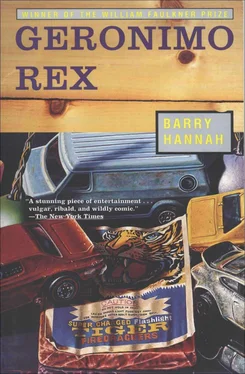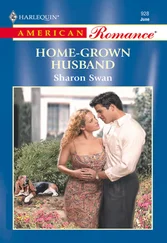“Great God,” I said.
“Waitl” said my wife. She had her hand on the pillow. “Kiss my toe, hard! Oh that tickles too much. Kiss my mouth. Yum yum. So do you like how I kiss? I almost wore out my mouth kissing you. My lips were sore. I was sore all over thinking about getting somebody like you. And now I’ve got you. Owl Owwl”
In the big dirt-creased white house in the winter light of Fayetteville, she was the same brittle and young thing I had married. It was as if I’d assaulted a child who did not call the police but followed me with wild concern everywhere I went.
In the grocery store, she didn’t look old enough to be filling up the cart with such calculation. She looked like the eldest urchin in a crowd in Rome, buttoned up in cunning little adult-like clothes. I would walk a piece away from her and see the men pass by her with looks of shamed lust. The poor bastards. I knew exactly what it was like, and forgave them completely. Prissy was so cute, the dream of a dago high school, and here she was choosing a roll of toilet paper, the expensive and scented kind that you imagined they hurled over a blossoming orchard of peaches and apples to get the smell all through the tissue. This was when we still had a lot of wedding-gift money.
She wanted clothes. She established accounts at every clothing shop in town. We bought furniture, and a Zenith television. I wanted a good stereo. She bought everything in the way of fashion that Fayetteville could bring down from the East. The T-bird must be rebuilt, must have new mufflers so it wouldn’t sound like a redneck car. The twenty-dollar bills went over the counters and a dime and three dirty pennies came back. What we had the first month was a spending riot. My check for teaching the freshman class at the university was $216. You see the big gifts come at you at the wedding and you get the notion they’ll always be coming, and all the while the credit manager at Montgomery Ward is honing his pen for the first nasty note and the magistrate is drilling the police in procedures for the collecting of bad checks.
While you listen to Otis Redding on the stereo and dip the Johnny Walker and throw a couple of parties, in honor of what a fine heedless son of a gun you are.
She wanted me to take her out for something literary, so she could understand a little bit of what I was doing. Wyatt Fred, a poet almost seven feet tall, was giving a reading in the basement of the Episcopal Student Center. We sat in the folding steel chairs. There were about twelve in the audience, everybody so much his own man that he sat lone-some and away from everybody else. Prissy and I were the only two sitting together. Two professors of mine were there; the rest of them were people with thick glasses and distressed hair. Wyatt came on and read like a wizard. The poems were quite good, and we clapped after each one, sounding like fish flapping to death in a concrete garage.
I noticed Leslie Bill Harrow was there. I wondered why. Leslie Bill taught me. He was a novelist who hated poets, every one of them. He liked to invite visiting modern poets to his house of yellow pine beams and jalousied glass on the mountain. He liked to get them drunk and expose them as specious droolers, in full view of several people who worshiped the poet and worshiped poetry as an aloof science. First time I met him, in fact, he sent me a note asking to see my poems, and when I went to his office to pick them up, he said that he had lost them; then he admitted that he had thrown them away.
Also sitting there was Dr. Lariat He had a mild, groomed appearance, fifty years old, a bachelor, wearing a tame plaid jacket and a tie whipping askew casually. His hair was salted and thick, and he was a stiff, almost pretty sort of man. I admired him, first, for simply being a bachelor. He had the cleanliness of the life of pure mind about him. How had he made it, how had he read all the great venereal works of all literatures, as he had, without breaking down? Why didn’t he need the comfort, the warm constant flannel, of a wife? He’d taken his degrees at Columbia, before the war. He was a miserable teacher in a peculiar way; he controlled the misery of his classes. Lariat would stare out the window during a class for unbelievably long periods, sometimes up to fifteen minutes. Everyone knew he was supposed to be a cultural giant. He did the reviews for a Kansas City paper, and in 1950 he drew wide attention for an article describing all fiction since Henry James as “smelly.” Otherwise, he had not done so much, but he had done it right. He had published four articles on Jane Austen, Samuel Richardson, Jonathan Swift, and Bernard Shaw in the right literary quarterlies. I understood that he had once had a big student following. The students thought he was pausing after they said something because he considered any and every idea provocative and seminal. They thought he was a beatnik. Then, around 1959, they found out that those long pauses were swoons of utter contempt for any human voice except his own. His heart was not present in the room at all. You did not know where his heart was, but you had the feeling that if you ever went to that place, you would be laughed at.
The Arkansas sunlight seemed to hurt him. When sun-light and the student herd mixed, you would see Lariat, distraught-looking, toiling along the borders of the hall. When the students came out of his class, they looked distraught. There was fear in his classes. Some feared he would, say, strike , after those long pauses. Everyone was worn out waiting for the bell. After the pause, he would say something like: “Henry James did not write about anything so heinous as real life.” When you spoke to him, he was polite, but he seemed to be on the verge of running away to a shadowed, violet scene of warmer conversation with one of the Muses.
His hometown, I found out, was Dream of Pines, Louisiana.
Wyatt Fred read some very strong local-color things about butchery and coitus, car wrecks, and abortions. I looked at Lariat. The thinnest, but yes, smile. He merely put his hands together when the rest applauded. Perhaps he had attended to give modern literature still another chance.
Prissy touched at me all during the reading. When it was over, she hadn’t understood one iota of Wyatt’s poetry, I don’t think, but she was moved by the fact that Wyatt had read with such conviction. I hustled her out to the car. These were my teachers and I didn’t care for her to give voice around them.
Going home, we drove down that long fall of School Street to the eight-room house sitting next to Highway 71.
It was about a month later, the night after the big March snow, I was coming home drunk from Roger’s Recreation, and found myself on the top of School Street and could barely hold myself back from sliding on the ice all the way down to my house. I had two envelopes with letters from the police about two big bad checks and I’d just written another bad one to Roger — who never prosecuted me, bless him, and took my word — and I threw those envelopes on the ice, saw them take off down the hill on the ice, out of sight, lovely. I had also found this tin cup lying in the middle of a tire rut on Dickson Street, and I was carrying it, for what or to where, but I had an idea which gripped me. I would lay hand on myself and produce an audience of my own sperms in the cup, which would be a sort of amphitheatre, and lecture to them, and also pull out of my coat my new poem, and by God I would read the last drop of juice out of it, and in the cup by God there would be little ears that would hear it, and I put my ear over it; they were applauding already. But, unbuttoning my coat, I slipped and fell on the ice and took a dire lick on the back. I knew this was not a simple injury. I should be taken to a home for the hurt. The sleet was biting my face to pieces. In the air over me I saw a beam. A car with clinking chains stopped just in back of my head. Then a cop looked down at me out of a nylon and fur jacket. I told him to give me a shove, I could make it on down the hill. He told me I was drunk and told me not to tell him what to do. He said: “Lie out of the road.” I told him I was a student, a teacher, and poet in my spare time. I asked where my cup was. He held over me with the look of a dog pissing. Then he yelled to the other cop at the wheel. I got up, not hurt so bad as I’d feared. But I told him I was hurt very profoundly. The car drew up and they told me to get in. The inside of the car was hot and there was a grate between me and the two of them on the front seat. I was plotting my escape, how to yank the pistol from whose leg, because I could not see the disgrace of a cell. It passed my mind that they might not know I’d written the bad checks but were going to book me on a charge of attempted masturbation, plus lying in the road. I could not drag my name into this. Then the driver asked me where I lived, I told him, and they let me out at my front door.
Читать дальше












